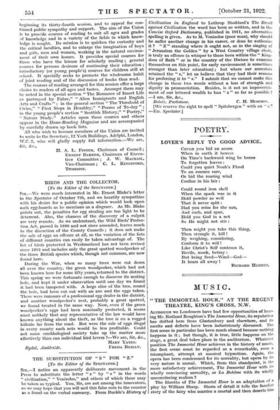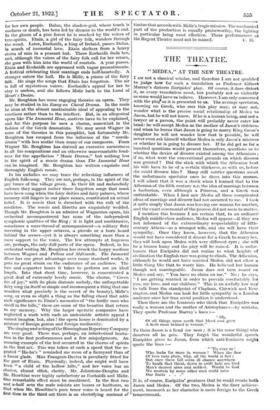m - u - sIC.
" THE IMMORTAL HOUR," AT THE REGENT THEATRE, KING'S CROSS, N.W.
Aurnouon we Londoners have had few opportunities of hear- ing Mr. Rutland Boughton's The Immortal Hour, its reputation has drifted here from Glastonbury and elsewhere, and its merits and defects have been industriously discussed. The first scene in particular has been much abused because nothing happens in it ; but though, it is true, little happens on the stage, a great deal takes place in the auditorium. Whatever position The Immortal Hour achieves in the history of music, the first scene must be regarded as a remarkable, -even Li triumphant, attempt at musical hypnotism. Again, the opera has been condemned for its unreality, but opera by its very nature is unreal. Which, from this standpoint, is the more satisfactory achievement, The Immortal Hour 'with its wholly convincing unreality, or La Boheme with its wholly unconvincing realism ?
The libretto of The Immortal Hour is an adaptation of a play by William Sharp. Shorn of detail it tells the familiar story of the fairy who marries a mortal and then deserts him
for her own people. Dalua, the shadow-god, whose touch is madness or death, has been led by dreams to the world's end. In the gloom of a pine forest he is mocked by the voices of tree-spirits. Etain, a girl of the fairy folk, wanders through the wood. Later, Eochaidh, a king of Ireland, passes Dalua, in search of immortal love. Etain shelters from a heavy storm of rain in a peasant hut. There Eochaidh finds her, and, although the voices of the fairy, folk call for her return, she goes with him into. the world of mortals, A year passes. Etain and Eochaidh• are oppressed with vague presentiments. A festival celebrating their marriage ends half-heartedly. A stranger enters the hall. He is Midir, a prince of the fairy folk. He sings. the songs that Etain has forgatten. The air is full of mysterious voices.. Eochaidli's appeal for her to stay is useless, and. she follows Midir back to the Land of Heart's-Desire..
Mr. Boughton has some engaging theories on opera. They may be studied in his Essay on Choral Drama. In the main he aims at. the almost unattainable. ideal of appealing to the emotions rather than to the intellect. But, in an allegorical opera like- The Immortal Hour,, motives have to be explained, and for this purpose he uses a chorus; somewhat in the fashion of the Greek dramatists. We may scent Wagner in. some of the theories in- this pamphlet,. but fortunately Mr. Boughton has escaped from the influence of the " musik- drama" with less scathe than many of our composers. From Wagner Mr.. Boughton has derived an excessive earnestness in all his compositions. and an otherwise unaccountable fond- ness. for the appellation " Music Drama," but nothing- less in the spirit, of a music drama than The Immortal Hour can be imagined. Mr. Boughton has written exquisite and thoroughly. English music.
In his: melodies .we may trace the refreshing influences of English folk-song. They am not, perhaps,,in the spirit of the gay tunes. of the village. green. In their lilt and melancholy- cadence they suggest rather those forgotten songs that must have been sung; when, the fairy deities and fairy palaces,,whose memory still lingers. in our place names, constituted an actual belief. It is music that is drenched with- the cult of the mistletoe. The music and libretto arc exquisitely wedded. Though Mr. Boughton is an admirer of Wagnerian opera, his orchestral accompaniment has none of the independent symphonic qualities of the Ring ; it is light and unobtrusive, sometimes a- mere thread of accompaniment—a solitary flute wavering in the upper octaves, a piccolo or a horn, heard behind the scenes—yet it is always something more than a mere support to the voice. The few attempts at hugeness are, perhaps, the only dull parts of the opera. Indeed, in his orchestral writing Mr. Boughton has struck the happy medium between Wagner and Pelleas and Melisande. The Immortal Hour has one great advantage over many standard works, it puts no great strain on the endurance of an audience. The two and a-quarter hours it takes to perform are an ideal length. Into that short time, however, is concentrated' a great deal of extremely' lovely music. The chorus, " Green lire of jay,"' with its plain diatonic melody; the unforgettable fairy song (in itself-so simple and inconsequent a thing that one wonders what precisely' is the secret of its beauty), Midir's song, or even so slight a thing as the falling chord that adds such significance to Etain's memories of "the lordly ones who dwell in the hills," these are some of the beauties that return to my memory. Why the larger operatic companies have neglected' a work with such an undeniable artistic appeal I cannot imagine, but, alas ! the opera house is dominated by a mixture of foreign genius and foreign mediocrity.
The singingand'actinguf the Birmingham Repertory Company are very good: There was, perhaps, an infinitesimal hesita- tion in the first performances and a few misjudgments. An amusing example of the last occurred in the chorus of spirits in the first act. This was taken at such a speed that the re- peated " Ha-ha'S " reminded me more of a farmyard. than of a forest glade. Miss. Frangcon-Davies is peculiarly fitted for the part of Etain. Physically-, indeed, she might well have been " a child of the hollow hills," and her voice has an elusive; almost' elfish, clarity. Mr. Johnstone-Douglas and Mr. Heseltine were highly satisfactory as Eochaidh and Midir. One remarkable effect must be mentioned. In the first two and a-half acts the male soloists- are basses or baritones, so that when Mr. Preseltbne'S pure tenor voice is heard for the first time in the third. act there is an electrifying contrast of timbre that accords with Midir's tragic mission. The mechanical part of the production is equally praiseworthy, the lighting in particular being most effective. These performances at
the Regent Theatre must not.be missed. C. II.



































































 Previous page
Previous page